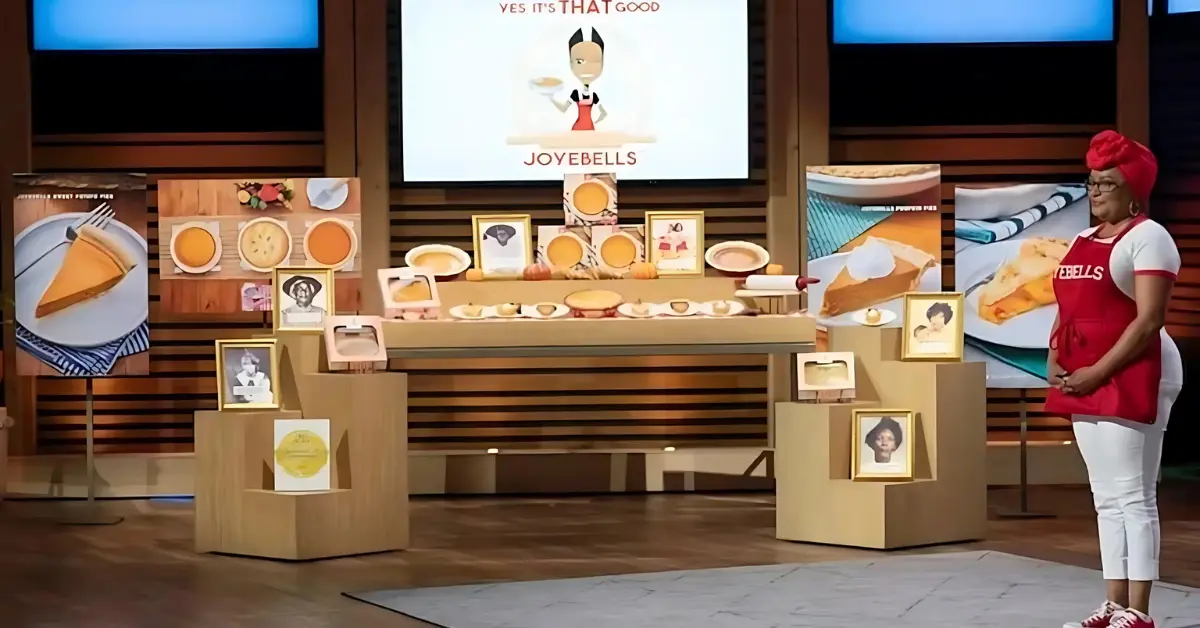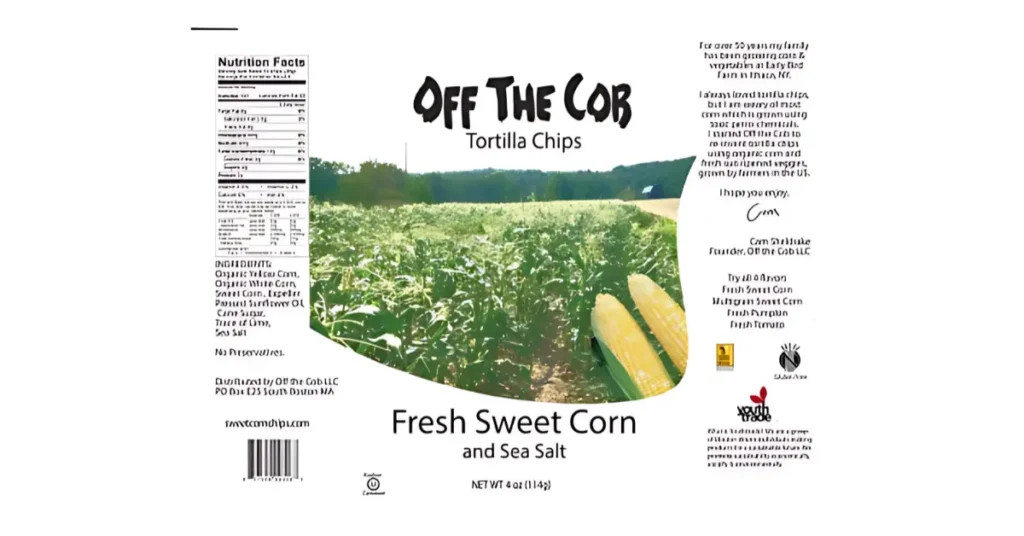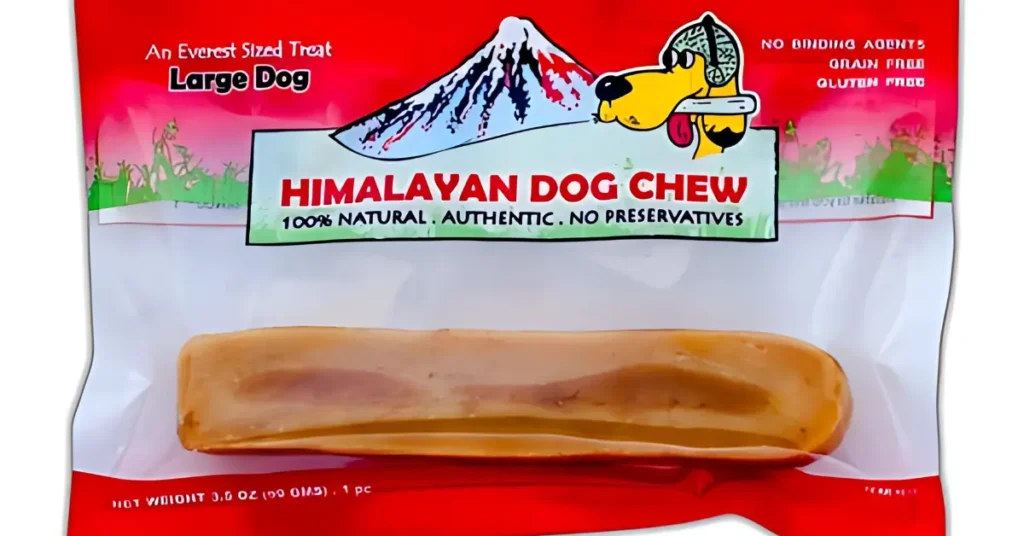Joyebells offers premium refrigerated pies made from family recipes. Experience homemade flavor with Southern-style peach, pumpkin, and sweet potato pies today!
After facing challenges with retail demands for shelf-stable pies, Joy B. Moore of Joyebells returned to refrigerated pies, preserving the homemade flavor her customers love. Despite initial setbacks, including losing major clients, she believes that staying true to her product’s integrity will lead to long-term success.
In her Shark Tank pitch during Season 16, Joy sought $600,000 for 10% equity in her premium refrigerated pie business. However, despite receiving positive feedback on her pies, she left without securing a deal. The sharks were concerned about the company’s high valuation and low-profit margins. Joy’s sales were strong, with $7.7 million in revenue in 2023, but projected to dip to $4.3 million due to the shift to refrigerated products.
Although Joy’s pies cost $5.23 to produce and sold for $7.84, the sharks found her profit margins unsustainable. Despite discussing potential cost-cutting measures, including a new manufacturing partnership, the sharks didn’t see a clear path to profitability.
Shark Tank Results:
| SHARK | RESULTS |
| Mark Cuban | No offer |
| Barbara Corcoran | No offer |
| Kevin O’Leary | No offer |
| Lori Greiner | No offer |
| Robert Herjavec | No offer |
Post-Shark Tank Update:
Since airing on Shark Tank, Joyebells has seen a significant boost in sales. The brand is expanding its retail presence and is set to launch its pies in Costco stores in the Northeast by late 2024. Additionally, Joyebells will be available in Schnuck stores across the Midwest and Kroger stores in the Mid-Atlantic region. The pies can also be purchased through the Joyebells website and from other retail partners.
Stay tuned for more updates on the brand’s growth as it continues to spread the joy of its Southern-style pies to a broader audience.
Table of Contents
ToggleKey Takeaways:
- Joyebells’ Legacy: Founded by Joy B. Moore, Joyebells offers premium, refrigerated Southern-style pies made from six generations of family recipes.
- Shark Tank Appearance: Despite not securing an investment in Shark Tank Season 16, Joyebells leveraged the exposure to significantly grow its brand.
- Retail Expansion: The company has expanded its presence in major retailers like Costco, Schnuck, and Kroger, enhancing nationwide reach.
- Online Growth: Joyebells has bolstered its direct-to-consumer sales via its website, tapping into the growing demand for premium food delivered straight to homes.
- Operational Improvements: Joyebells has partnered with a new manufacturer to lower production costs and streamline operations, enhancing profitability.
- Brand Loyalty: The company has cultivated a strong customer base through social media, influencer partnerships, and community engagement.
Joyebells Net Worth in 2024:
for 2024 specifically, the net worth of Joyebells is best approximated at around $4.3 million, reflecting the company’s transitional phase after product recalls and strategic shifts, with a lower revenue forecast compared to 2023. The $6 million valuation from the Shark Tank pitch was optimistic but not realized due to operational and financial challenges.
Joyebells Net Worth in 2025:
As of 2025, Joyebells’ net worth is estimated to range between $4.3 million and $13.8 million, reflecting the company’s ongoing recovery from a major product recall and strategic shift toward refrigerated pies. With new retail partnerships in major grocery chains and increased brand exposure, Joyebells is positioned for growth, though profitability challenges remain.
The Birth of Joyebells: A Story Rooted in Tradition
The story of Joyebells starts with Joy B. Moore’s family recipes, which have been passed down for six generations. These traditional Southern-style pies are made with a dedication to quality, authenticity, and comfort. Joy B. Moore, who had been baking for over 30 years while working in nonprofit education, decided to turn her passion for baking into a business. Joyebells was born to bring people together over comforting, homemade pies.
Joy’s decision to enter the competitive pie market was rooted in her desire to share the comforting taste of home with a larger audience. However, as her pies gained popularity, she soon faced the harsh realities of scaling a business while maintaining quality. Retailers demanded longer shelf life, prompting Joy to add preservatives to her pies to meet mass production requirements. Although this extended the shelf life, it compromised the taste that made the pies special. Adding preservatives changed the flavor, and while sales increased, the profit margins weren’t enough to sustain long-term success.
The Shift Back to Refrigerated Pies: A Bold Decision for Quality
Realizing that maintaining the authentic, homemade taste was crucial to her brand’s identity, Joy boldly returned to refrigerated pies. This choice came at a cost — she lost two major clients who preferred shelf-stable products. Despite this, Joy believed staying true to the original recipe would ultimately be more rewarding for her business and customers in the long term.
This pivotal decision set the stage for her Shark Tank appearance. Joy ensured that they remained fresh and true to their homemade flavor by focusing on refrigerated pies. The challenge, however, was that refrigerated pies have a shorter shelf life and require more careful handling and distribution. This meant that Joy would need to secure partnerships with retailers willing to accept her product’s unique logistics.
The Shark Tank Pitch: High Stakes and Tough Questions

In Season 16 of Shark Tank, Joy B. Moore entered the tank seeking $600,000 for a 10% equity stake in her business. At the time of her pitch, Joyebells was already an established brand with a loyal customer base. Her pies, which include Southern favorites like peach, pumpkin, and sweet potato, had found their way into major retailers like Sam’s Club and Food Lion.
However, the sharks were skeptical. Despite Joy’s impressive backstory and the high-quality pies she offered, the sharks were focused on the financials and the business model. Joy’s valuation of $6 million was based on her lifetime sales of $16.1 million, but this didn’t impress the sharks as much as it might have. In 2023, Joyebells generated $7.7 million in revenue, but its gross profit margin was just 8.85%, and its net profit margin was even lower at 1.38%. This raised significant red flags for investors concerned about the company’s profitability.
When Joy explained that her decision to move away from shelf-stable pies had temporarily reduced her sales, Robert Herjavec pressed for further clarification. Joy’s explanation that refrigerated pies were necessary to maintain the product’s quality was logical, but the sharks were not convinced that this model would lead to sustainable profits.
One of the most critical questions came from Kevin O’Leary, who pointed out that Joy’s costs were too high. Each pie cost $5.23 and was sold to retailers for $7.84. Retailers then sold the pies for $10.99, which provided a seemingly healthy margin. However, the sharks were concerned that the high production costs were limiting the potential for profitability. Joy’s response, which included a new manufacturing partnership aimed at reducing costs to $4.96 per pie, still didn’t satisfy the sharks. Kevin O’Leary bluntly stated that the business would never make money with these costs.
Barbara Corcoran, while impressed with the product, suggested that Joy consider raising prices to improve profitability, a strategy that had worked for other entrepreneurs she had mentored. However, Joy explained that retailers largely dictated pricing decisions, limiting her flexibility.
Despite the sharks loving the taste of the pies — Robert Herjavec even called them “the best pies ever featured on the show” — none of the investors were willing to make a deal. The combination of high production costs, slim margins, and the risk associated with the transition to refrigerated pies ultimately led to a unanimous decision to pass.
Post-Shark Tank Growth: Resilience and Strategic Expansion
Although Joy left Shark Tank without a deal, her business didn’t stagnate. It experienced significant growth, proving that sometimes rejection can spur a company to accelerate its development.
1. Boost in Sales and Retail Expansion
One of the most significant post-Shark Tank developments for Joyebells was the increase in sales and the expansion of its retail footprint. Since airing on Shark Tank, the company has seen a notable rise in product demand. This uptick in sales is not only attributed to the exposure from the show but also to the brand’s commitment to maintaining quality and authenticity in its product offerings.
Joyebells successfully secured new retail partnerships, with plans to launch its original recipe pies in Costco locations across the Northeast by late 2024. This expansion into a major national retailer presents a significant opportunity for Joyebells to reach a broader customer base, particularly those seeking premium, homemade-style pies.
Additionally, Joyebells has expanded its retail presence by securing distribution deals with Schnucks, a prominent supermarket chain in the Midwest, and Kroger, one of the largest grocery retailers in the Mid-Atlantic region. These new partnerships will help Joyebells reach new customers and increase its market share, particularly in the refrigerated pie category.
2. Online Presence and Direct-to-Consumer Sales
While retail distribution is critical in the brand’s expansion, Joyebells has also focused on enhancing its direct-to-consumer sales. The Joyebells website offers an easy-to-navigate platform for customers to purchase pies online, with delivery options that bring the comfort of homemade pies directly to their doorsteps. This online presence is crucial for building a direct relationship with customers and providing convenience in purchasing.
3. Focus on Marketing and Branding
Joyebells has also invested in strengthening its brand identity and marketing efforts. As a brand rooted in family tradition, Joyebells emphasizes its story and values, which resonate deeply with customers. The company’s commitment to quality ingredients, such as using only premium, fresh ingredients for its pies, has helped build customer trust and loyalty.
Through social media, email marketing, and targeted digital campaigns, Joyebells has effectively connected with its audience, driving traffic to its website and increasing brand recognition. These efforts have increased sales and positioned Joyebells as a premium pie brand in the market.
4. Operational Adjustments and Cost Management
Recognizing the importance of profitability, Joyebells has significantly adjusted its operations to reduce costs while maintaining high-quality standards. The new manufacturing partnership, which lowers production costs, is expected to improve the company’s gross margins over time. Joy’s focus on improving the efficiency of her supply chain and production processes will allow her to maintain product integrity without sacrificing profitability.
5. Expanding Product Line and Seasonal Offerings
In addition to its signature peach, pumpkin, and sweet potato pies, Joyebells has plans to expand its product offerings. Seasonal pies, such as apple and pecan, are being introduced to cater to different customer preferences throughout the year. Special edition pies for Thanksgiving, Christmas, Easter, and other major celebrations will also help boost sales during peak periods.
6. Community Engagement and Charitable Initiatives
Joyebells has remained committed to giving back to the community, especially through charitable initiatives. The company actively supports local causes and has built strong relationships with organizations that share its values. By aligning itself with philanthropic efforts, Joyebells has strengthened its reputation as a brand that cares about more than just profit.
Looking Ahead: The Future of Joyebells
As Joyebells continues to grow, its focus will remain on maintaining product quality while expanding its reach. The challenges faced in the early stages of the business, particularly the difficult decision to move away from shelf-stable pies, have provided valuable lessons that will serve as the foundation for future success.
With new retail partnerships, a growing online presence, and a commitment to maintaining quality, Joyebells is well-positioned to continue its upward trajectory. The lessons learned from Shark Tank and the resilience and determination shown by Joy B. Moore will guide the brand as it seeks to establish itself as a leader in the refrigerated pie market.
Conclusion
Joyebells’ journey is a testament to the power of resilience and staying true to one’s values in the face of adversity. Despite not securing an investment from the sharks, the company has experienced significant growth, securing new retail deals, increasing its online presence, and expanding its product offerings. As the brand continues to innovate and grow, Joyebells is poised for long-term success, bringing the comforting taste of homemade pies to even more nationwide customers.
This update reflects the ongoing evolution of Joyebells, showcasing how a combination of strategic decisions, strong marketing, and a focus on quality can drive success in a competitive market.
For the latest updates from Shark Tank Season 16, Episode 11, explore the links below:
- FLAMINGO UPDATE
- LECTEC UPDATE
- BUMPEEZ UPDATE
Before you go, make sure to check out our list of all the Shark Tank Season 16 products.









